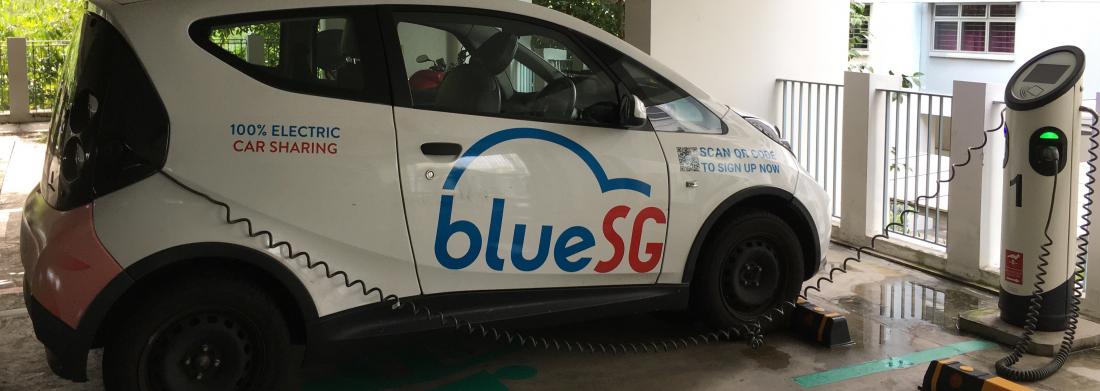An electric car at a multi-storey carpark in Singapore
Newcastle University (UK) and the Energy Research Institute at Nanyang Technological University hosted a symposium, Accelerating Electromobility in the UK and Singapore, funded by the UK Government, from 17-19 April 2023 in Singapore. The event aimed to foster bilateral partnerships and research to address barriers to widespread electric vehicle adoption. Participants, including industry, government, and academia, discussed technology, economics, and policy perspectives over three days, emphasizing opportunities for joint collaboration in advanced electric transport research and commercialization. The symposium provided insights for promoting electromobility in both countries and encouraging academic and industry cooperation. The organising team comprised members from Newcastle University (UK) and Newcastle University in Singapore, namely Duncan Rayner, Luke Judd, Tim Rockell, Jo Geary, Anurag Sharma, Kheng Lim Goh, Stuart Edwards.
The key take-away points from this conference that can guide critical projects and research areas requiring additional investment to accelerate the transition to transport electrification are as follow.
1. Modelling for EV Charging Stations: The symposium emphasized the importance of modeling to determine the number, location, and type of EV charging stations. Projects to review and improve existing models were suggested.
2. Consumer Behavior and Perceptions: Understanding public perceptions of EVs and factors influencing consumer decision-making is crucial for increasing EV uptake and designing infrastructure.
3. Policy Positions: The symposium discussed different policy approaches, targets, and incentives offered by both governments. A comparative review with successful transition countries could provide valuable insights.
4. Grid Infrastructure: Upgrading the grid to support energy demands of electromobility requires investigation. This includes energy demand modeling, technical aspects of connecting charging stations, and energy demand optimization.
5. Types and Locations of Charging Stations: Determining the best locations for charging stations depends on factors like costs, space, and public convenience. Investigating charging station locations and types (slow/fast) is essential for setting up EV infrastructure.
6. Renewable Energy and Energy Storage: Symposium participants discussed the use of renewable energy and energy storage in charging infrastructure. Further research on battery exchange and technical solutions is suggested.
7. Business Modeling for Private Sector Investors: Partnerships between government, research institutions, and industry are crucial for progress, but private investors seek viable business models for investing in EV infrastructure.
8. Alternative Fuels: Hydrogen as a fuel for heavy transport was discussed, but rapidly changing technologies require governments to stay updated and formulate adaptive policies.
9. Policy Framework during Transition: Policymakers need advice on flexible timelines, incentives, technical standards, safety, and hybrid technologies during the transition to electromobility.
10. Urban Planning and Transportation: EV progress may not reduce transportation burden; policymakers should focus on urban planning to minimize transport demands.
11. Autonomous Vehicles (AVs): AVs will play a role in transport electrification; studies should explore how AVs can aid progress in public transport, urban planning, and fleet management.
12. Battery Technology and Recycling: Battery research and funding are critical for large-scale, sustainable battery production, charging, storage, recycling, and disposal.
13. Engineering Challenges of Batteries: Deploying batteries in EVs requires addressing engineering challenges like stack connection, performance optimization, safety, and thermal management.
14. Training and Skills: Investment in training and curriculum development is essential to support a skilled workforce for electromobility, including battery and vehicle production and maintenance.
The organising team has put together the details of these points in a post-symposium report. To obtain a copy of this report, or to know more about this report and symposium, please contact Associate Professor Kheng Lim Goh at [email protected].
To complement this document is a supporting document on 'Insights on the Singapore electromobility symposium: quantitative analysis'. This supporting document described the results of the feedback and survey on the participants, conducted during the symposium. This document can be accessed at ePrints DOI: 10.57711/n3ax-2088.



